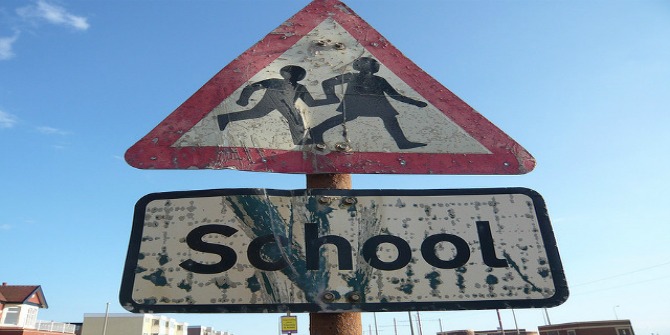 Using a case study, Stephen Rayner draws parallels between the academisation of schools in England and the discourses around the EU Referendum. Following numerous fieldwork interviews, he divides participants into two categories: those who wished to Remain a local authority school and those who wished to Leave. The final result? A rather messier reality falling somewhere awkwardly between the two…
Using a case study, Stephen Rayner draws parallels between the academisation of schools in England and the discourses around the EU Referendum. Following numerous fieldwork interviews, he divides participants into two categories: those who wished to Remain a local authority school and those who wished to Leave. The final result? A rather messier reality falling somewhere awkwardly between the two…
The case for the school’s Remain group began with the recognition that the local authority was far from perfect; there was too much bureaucracy and often that bureaucracy seemed to work for its own ends rather than the ends of the schools. There was some appearance of democratic accountability, but in reality the individual councillors made most of their decisions without thinking too hard about the electorate, and the number of electors who actually voted was relatively small. The local authority did need to be reformed. However, the Remain group of staff argued that reform would be best carried out by schools continuing to be part of the local authority, influencing from within, building on the existing collaborations and working together to deal with the educational and social challenges faced by the community. Being part of the local authority would not prevent the school from developing new partnerships outside it. A decision to Leave would be irreversible and therefore a risk.
In the year that elapsed between the first and second interviews with the school staff, support for this option dwindled as most of them became persuaded by the case to Leave and become an independent academy.
The Leave case argued that local authorities were a thing of the past. Interviewees said they were ‘tired of being ruled by faceless bureaucrats in the Council’. Local authorities were unwieldy bureaucracies that were difficult to hold to account. They top-sliced school budgets rather than let schools decide how to spend their own money. Without this top-slicing, there would be much more money to spend on teaching and learning. School meals would be better. The school day could be changed. If only the school had more autonomy, or freedom, or ‘sovereignty’, it could make its own decisions and develop its own policies. Leaving would not put an end to collaboration: in fact, it would open the way to developing new partnerships. The school could form agreements with other schools from all over the country, rather than be limited to a single area. It could forge a distinctive identity based on its traditions that would make it more competitive in the local education market.
By far the greatest advantage of the change of status, according to the Leave group, would be that the school could change its admissions policy. This was mentioned by almost all the interviewees. The school had a strong record of accepting pupils who had difficulty finding places in other schools, whether because they had particular learning needs, or because their parents had moved into the area to find employment, or because they had been excluded elsewhere. I use the generic term ‘migrants’ for these pupils. They had been well looked after on arrival at the school, had integrated successfully and their needs had been met. This was after all a popular and well-resourced school. Staff were not against these ‘migrants’ per se, but the majority view was that the school was full and really could not take any more of them without draining resources and damaging the provision for the pupils who were already there. Why should other schools not take their fair share of these pupils?
By the end of the fieldwork the Leave campaign appeared to have been successful. Staff were persuaded that this was the best outcome for the school, those it served and those who worked in it. Even those who had valued the local authority saw it as a relic of the past and thought that it no longer provided a viable option. But the Leave solution proved unworkable. The schools with which new partnerships were sought became less enthusiastic when they reached the point of signing off formal agreements: after all, they had their own ’sovereignty’ to think about and in any case some were satisfied with the service that they were receiving from the local authority. The school still had a huge financial commitment to maintaining its infrastructure that it could not bear alone as it was tied into agreements negotiated by the local authority. The ties with the local authority therefore proved to be more difficult to break than anyone had expected.
Local politicians were not prepared simply to allow the break-up to happen and went out of their way to delay or obstruct it. So the result, at the time of writing this post, is that the school has not broken free from links with the local authority, but has merely relaxed those links slightly and is working on a compromise. A lengthy and at times heated debate over a binary ‘In or Out’ decision has not been resolved to anyone’s satisfaction. The parallels between academisation and the EU Referendum might certainly discourage anyone from assuming that the outcome of either will be straightforward or conclusive…
___
Note: This blog is based on doctoral research focusing on policy analysis of academisation, viewed through a case study of the academisation process in a school in England. The fieldwork for the study includes interviews with governors, leaders, teaching and support staff at the school.
 Stephen Rayner has experience as a teacher, deputy head, school governor and local authority adviser. He is currently studying for a part-time Doctorate in Education at the University of Manchester. The main focus of his research is the inter-relationship between policy, values, leadership and professional practice in schools in England.
Stephen Rayner has experience as a teacher, deputy head, school governor and local authority adviser. He is currently studying for a part-time Doctorate in Education at the University of Manchester. The main focus of his research is the inter-relationship between policy, values, leadership and professional practice in schools in England.
(Image credit: PixelBrain CC BY NC SA 2.0)








